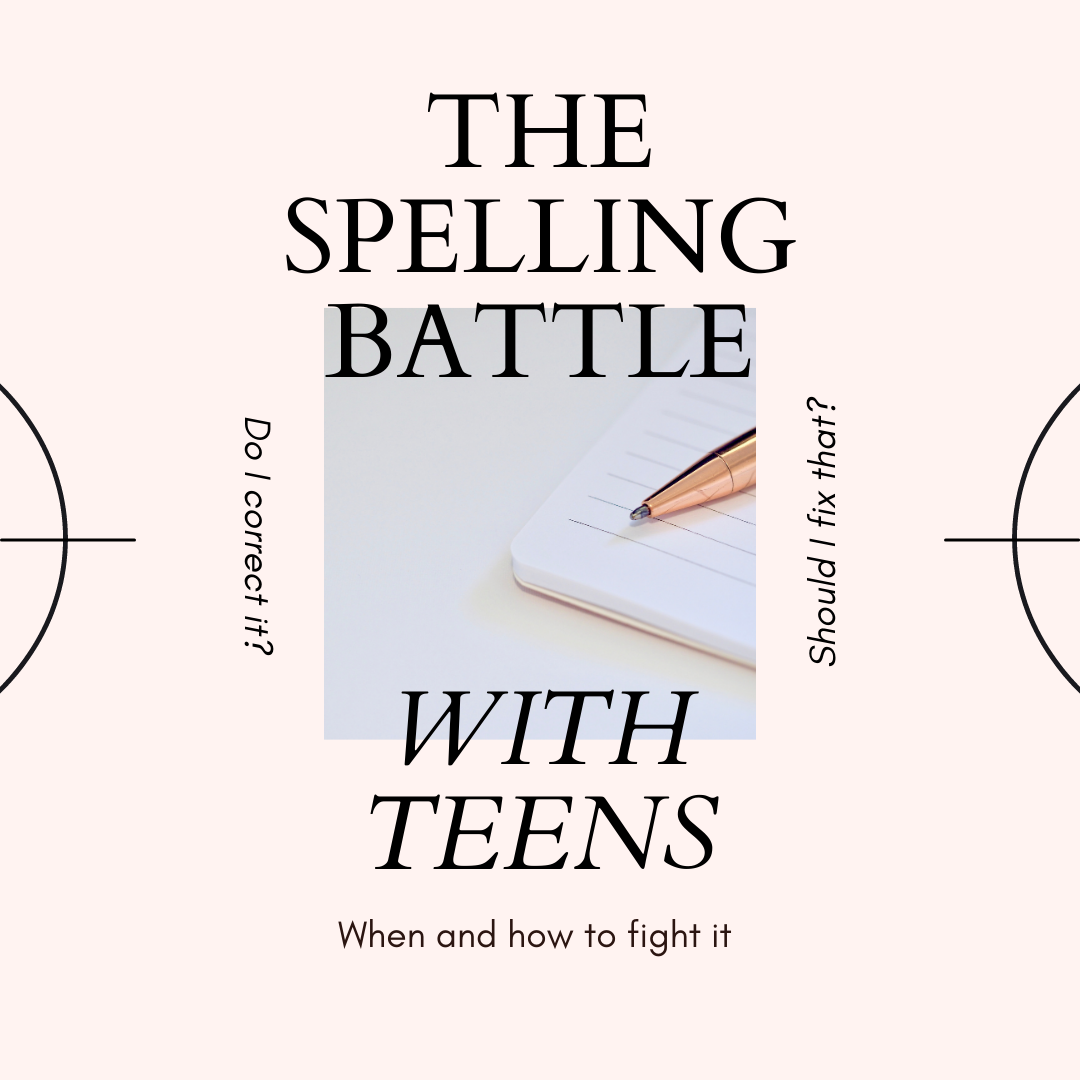When to pick and choose the spelling battle with teens
The spelling struggle is real! I often find myself cringing as I read my kids’ writing -filled with misspellings, grammatical mistakes and frantic correction of errors in Google Docs thanks to the real-time harassment provided by the colored error lines that pop up immediately with every mistake. It’s tempting to want to make corrections, and this was something I battled early on as an English teacher, as well as a parent; however, I’ve learned to pick and choose the spelling battle, and I hope to help you do the same.
Why not correct the spelling mistakes?
Typically, although not always, children who struggle with spelling are also reluctant writers. For these kids, spelling can really get in the way of producing their ideas on an ipad or on paper. I like to give kids permission to not worry about spelling, but rather focus on finding a flow and getting their thoughts out. If children feel like they are going to be judged or ridiculed for spelling mistakes, this can easily create a barrier in their writing.
Additionally, nobody likes receiving a draft marked up a hundred different ways-no matter what color the teacher or parent uses. There are plenty of research studies conducted on the psychological damage the infamous red pen can cause. Chances are a child in upper elementary or secondary grades is already a bit self-conscious of not being a great speller; so as the parent it’s not productive to contribute to that low self esteem-there are enough mean editors and professors in their future to do just that 😉
If the assignment is designed to teach structure, organization and development than the feedback should initially be on that-not spelling. The time to provide feedback on spelling is on the next draft of the editing phase. And when you do so, only focus on one rule rather than trying to hit them with all of them at once~ you have a better chance of them retaining the spelling rules if you only focus on one concept.
So then what do I do?
Here are some tips for helping your struggling teen speller:
- Have them handwrite their assignments- avoid the ipads at all costs! There is a lot of research that suggests that handwriting can help develop children as spellers~ see below for more on that!
- If they must be on an ipad, remove the talk to text feature and the spelling predictor. Both of these are enabling the spelling problem~ kids need to learn how to sound out words and these tools are actually taking that opportunity away from them and giving them a false sense of spelling success.
- Help them with sight words. Chances are they are not at grade level if they are a teen and still misspelling basic words~ so you may have to look a few grades below theirs to focus on helping them know high frequency words by sight.
- Work on basic phonics. Typically kids will get phonics instruction up through second or maybe third grade- at that point students are not taught how to read. In education we use the phrase “kids are reading to learn, not learning to read” to describe the shift that happens in third or fourth grade. So if your child is even slightly behind at this point, the gap will continue to widen as the years progress. While there are mixed opinions about teaching phonics to teens, I have tried it in small doses with both my 4th and 5th grader and noticed a HUGE difference in their spelling and ability to sound out words.
- Read aloud with them and READ A TON! Exposure to seeing and hearing words simultaneously can really help students with their phonemic awareness. With my own two kids (and even as a 10th grade teacher) I read aloud and also have my kids or students reading along in their own copy.
- Encourage your kids to also read independently and have them flag interesting words, big words or words they don’t know the meaning of, or how to pronounce. Then discuss the words with them and consider creating a spelling list for them to practice from there.
- Make spelling fun! My kids love to do spelling bees~ we simulate the National Spelling Bee weekly and it has turned into a real battle (like the good kind;) !
Spelling in writing matters- the world will pass judgement on an individual who struggles to spell correctly. So the spelling battle is one worth taking up, just go into battle with caution- intention, strategy and nothing but positivity!
Here are some resources on the topic to learn more:
- A thorough background on the topic: https://ngl.cengage.com/assets/downloads/ave_pro0000000320/am_tinajero_teach_fund_seb21_0413a.pdf
- Making a case for phonics in middle school: https://www.readinghorizons.com/reading-strategies/teaching/phonics-instruction/4-reasons-phonics-has-a-place-in-middle-school-and-high-school-classrooms
- Honoring the other side of the debate: https://www.google.com/search?client=safari&rls=en&q=ASCD+why+teens+shoudln%27t+do+phonics&ie=UTF-8&oe=UTF-8
- Hate the title, love the concept of this easy resource for you at home:https://www.amazon.com/dp/0545124093/ref=cm_sw_r_em_api_glt_fabc_B9HGZX60R5P0VBM2N8TQ?_encoding=UTF8&psc=1
- New study suggests handwriting engages the brain more than typing: https://www.ctvnews.ca/health/new-study-suggests-handwriting-engages-the-brain-more-than-typing-1.5132542
- One more article on how handwriting can help
